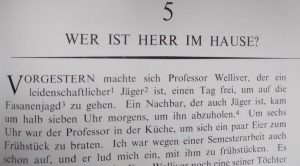Deutsch für Amerikaner, my mom’s old German textbook (copyright 1960) is an interesting social-history artifact. Here’s a passage where a university student from Germany discusses the American family he’s staying with. (All these people are fictional of course, but intended to be representative of their time and place.)

WHO IS HEAD OF THE HOUSEHOLD?
The day before yesterday Prof. Welliver, who is an enthusiastic hunter, took a day off to go pheasant hunting. A neighbor who also hunts came at 6:30 in the morning to pick him up. At six he was in the kitchen frying himself a couple of eggs for breakfast. I was also up early doing a term paper and he invited me to have breakfast with him. I was surprised that neither Mrs. Welliver nor one of his daughters had gotten up to help him.
He must have read my thoughts because he said: “Yes, my wife and daughters don’t think much of hunting and they think my enthusiasm for hunting is a bit queer.

So I can’t expect that they’ll get up at 5:30 in the morning. Where you’re from in Germany a professor can afford to hire a maid. But I can’t do that. Our American girls and women would rather work in factories and offices than in other people’s houses. That’s understandable. And then, of course, maids can charge so much money that a university professor can’t afford to keep one.”
Then I asked him: “May I ask a personal question?”
“Shoot!” he laughed.
“I can imagine your wife is tired,” I said, “but why did neither of your two daughters get up to make you breakfast?”
Prof. Welliver laughed: “They are also too tired. The life of an American girl in high school is more strenuous than you think.”
I looked at him with astonishment, because I knew that high school students here did not work nearly as hard as we do. He said his daughters were very popular and that meant they had to be at everything. Then Prof. Welliver saw that I had nothing left on my plate. “More toast, Karl, another egg?” Before I could answer, he had already put the bread in the toaster and cracked an egg into the pan. How friendly and affectionate it sounds when this professor with gray hair who specializes in the Reformation calls me Karl! And what a charming host he is! On such occasions I always feel something of the warm-heartedness and true humanity that could only have developed in democratic America.
And who is Prof. Welliver’s hunting partner? A dean? A colleague? An academic? Not at all! The neighbor is the manager of a grocery store in the center of our little university town. But the two men called each other by their first names, as I noticed when the professor got into the gleaming car.

I had offered to wash the dishes. How quickly one gets used to the American way of life! In Germany I would not have dared to offer a professor my help in his house, because it would have embarrassed him even if he didn’t have a maid. The thing about the maid is not so tragic, by the way. Mrs. Welliver does not have a maid but she has a refrigerator, a freezer, a vacuum cleaner, a washing machine with automatic dryer, an electric dishwasher, in other words everything that American technology has to offer the housewife.
However, it’s not the case that she has more freedom than a German housewife. She has many social duties. School, church, clubs and the social lives of her two daughters fill her days and some of her evenings.
I didn’t really like the fact that neither of the two girls had gotten up to help their father. And that they made fun of his hunting seemed to me disrespectful, considering their young age. This lack of paternal authority, or male authority in general, bothers me as a German especially. I know the absolute authority of the man, as was considered a given in Germany – especially Germany before the First World War – is not ideal. I myself know German families where the daughter cleans the father’s and brothers’ shoes on Sunday mornings while the “men” are still peacefully sleeping.
As a cultural critic, when I see something like that, I shake my head sadly. I do the same when I see Prof. Welliver’s daughters with their “boy friends” here in the house.
These visits by the “boy friends” are arranged through long telephone conversations. When the girls speak to their young men, neither the professor nor Mrs. Welliver nor I can get on the phone, because these conversations go on for hours. They giggle, and the most trivial things are discussed earnestly, to the point where you could think these girls were not entirely normal. But that’s not true. That’s just how they talk with their young friends. When I talk to them, all at once they become different people, very mature, very intelligent and full of interest in anything that is worth knowing.
If the “dates” come into the house, they have no consideration for anybody. The young people laugh and scream and dance to loud music from the record player. The fact that their father is sitting in his office upstairs working on one of his publications obviously does not bother them at all and their father doesn’t say anything. I always expect the door to his office to fly open and for him to demand quiet with a thundering voice. But that is a German expectation. The office door opens, but the professor just goes down to greet his young guests and tell them “Have a good time!”
But there’s one more thing I should mention. The girls’ long telephone conversations prevent me from using the phone, but they’re useful to me nonetheless. I have to listen, because the phone is at the foot of the stairs near my room. This way I can expand my American vocabulary and my list of untranslatable words. But I still don’t know why a certain Bill is “a card,” a certain Joe is “a square,” a certain Bob is “a doll,” and a certain Hank is “a creep”.
Great stuff. I especially like the professor specializing in the Reformation, and the “Kolonialwarengeschäft” – I didn’t know this term, seems to be an outdated word for a store selling “goods from the colonies.”
“The past is a foreign country; they do things differently there” as LP Hartley said.